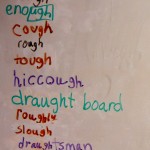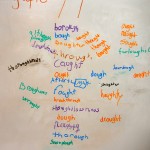Over the break I was reading some student writing, and I came upon the word ‘tho’. It seemed like the perfect opportunity to talk about the <ugh> trigraph . We began by looking at the word <laugh> and identifying the phonemes in this word. When we looked closely at the letter/phoneme correspondences, the students realized that in the word <laugh>, the <ugh> trigraph represents /f/. Then we looked at the word <though>. When we examined it in the same way, the students realized that in the word <though>, the <ugh> trigraph doesn’t represent a sound at all!
Then I asked the class to make two columns on their paper. In one column they were to list as many words as they could in which the <ugh> trigraph represented /f/. In the second column they were to list as many words as they could in which the <ugh> trigraph did not represent a sound at all. After a bit of independent work time, I asked students to come to the board and write the words they were finding.
This was such a fun activity! The words on the list in which the <ugh> trigraph did not represent a sound were a source for fascinating discussions. At first we didn’t recognize the word <snowplough>. Jacob went to the Collins-Gage Dictionary and found that it was an alternate spelling to <snowplow> which we are much more familiar with. The same thing happened when students found the word <hiccough>. This time they recognized that an alternate (more familiar spelling) would be <hiccup>. Many students did not recognize the word <bough> until I read it aloud. When I talked about decorating with boughs of holly, then the room was filled with, “Ohhh. Yes. I know that word.” The same thing happened with the word <furlough>. We ended today’s orthography time by reading aloud our lists of words. Tomorrow we’ll talk more about why the <ugh> trigraph is in some of the words when it represents no sound.


